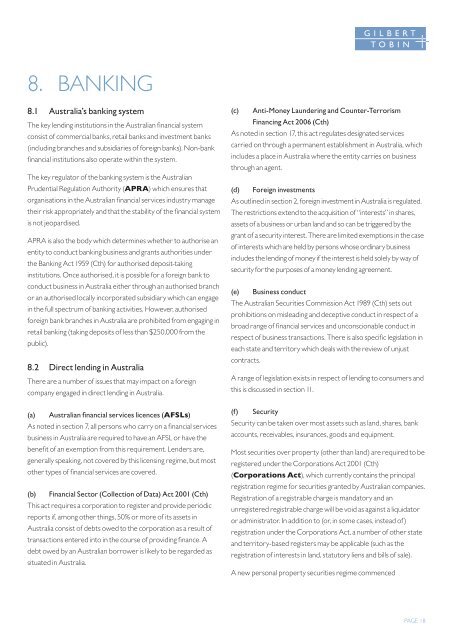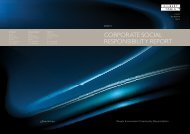Gilbert + tobin - Gilbert and Tobin
Gilbert + tobin - Gilbert and Tobin
Gilbert + tobin - Gilbert and Tobin
You also want an ePaper? Increase the reach of your titles
YUMPU automatically turns print PDFs into web optimized ePapers that Google loves.
8. Banking<br />
8.1 Australia’s banking system<br />
The key lending institutions in the Australian financial system<br />
consist of commercial banks, retail banks <strong>and</strong> investment banks<br />
(including branches <strong>and</strong> subsidiaries of foreign banks). Non-bank<br />
financial institutions also operate within the system.<br />
The key regulator of the banking system is the Australian<br />
Prudential Regulation Authority (APRA) which ensures that<br />
organisations in the Australian financial services industry manage<br />
their risk appropriately <strong>and</strong> that the stability of the financial system<br />
is not jeopardised.<br />
APRA is also the body which determines whether to authorise an<br />
entity to conduct banking business <strong>and</strong> grants authorities under<br />
the Banking Act 1959 (Cth) for authorised deposit-taking<br />
institutions. Once authorised, it is possible for a foreign bank to<br />
conduct business in Australia either through an authorised branch<br />
or an authorised locally incorporated subsidiary which can engage<br />
in the full spectrum of banking activities. However, authorised<br />
foreign bank branches in Australia are prohibited from engaging in<br />
retail banking (taking deposits of less than $250,000 from the<br />
public).<br />
8.2 Direct lending in Australia<br />
There are a number of issues that may impact on a foreign<br />
company engaged in direct lending in Australia.<br />
(a) Australian financial services licences (AFSLs)<br />
As noted in section 7, all persons who carry on a financial services<br />
business in Australia are required to have an AFSL or have the<br />
benefit of an exemption from this requirement. Lenders are,<br />
generally speaking, not covered by this licensing regime, but most<br />
other types of financial services are covered.<br />
(b) Financial Sector (Collection of Data) Act 2001 (Cth)<br />
This act requires a corporation to register <strong>and</strong> provide periodic<br />
reports if, among other things, 50% or more of its assets in<br />
Australia consist of debts owed to the corporation as a result of<br />
transactions entered into in the course of providing finance. A<br />
debt owed by an Australian borrower is likely to be regarded as<br />
situated in Australia.<br />
(c) Anti-Money Laundering <strong>and</strong> Counter-Terrorism<br />
Financing Act 2006 (Cth)<br />
As noted in section 17, this act regulates designated services<br />
carried on through a permanent establishment in Australia, which<br />
includes a place in Australia where the entity carries on business<br />
through an agent.<br />
(d) Foreign investments<br />
As outlined in section 2, foreign investment in Australia is regulated.<br />
The restrictions extend to the acquisition of “interests” in shares,<br />
assets of a business or urban l<strong>and</strong> <strong>and</strong> so can be triggered by the<br />
grant of a security interest. There are limited exemptions in the case<br />
of interests which are held by persons whose ordinary business<br />
includes the lending of money if the interest is held solely by way of<br />
security for the purposes of a money lending agreement.<br />
(e) Business conduct<br />
The Australian Securities Commission Act 1989 (Cth) sets out<br />
prohibitions on misleading <strong>and</strong> deceptive conduct in respect of a<br />
broad range of financial services <strong>and</strong> unconscionable conduct in<br />
respect of business transactions. There is also specific legislation in<br />
each state <strong>and</strong> territory which deals with the review of unjust<br />
contracts.<br />
A range of legislation exists in respect of lending to consumers <strong>and</strong><br />
this is discussed in section 11.<br />
(f) Security<br />
Security can be taken over most assets such as l<strong>and</strong>, shares, bank<br />
accounts, receivables, insurances, goods <strong>and</strong> equipment.<br />
Most securities over property (other than l<strong>and</strong>) are required to be<br />
registered under the Corporations Act 2001 (Cth)<br />
(Corporations Act), which currently contains the principal<br />
registration regime for securities granted by Australian companies.<br />
Registration of a registrable charge is m<strong>and</strong>atory <strong>and</strong> an<br />
unregistered registrable charge will be void as against a liquidator<br />
or administrator. In addition to (or, in some cases, instead of)<br />
registration under the Corporations Act, a number of other state<br />
<strong>and</strong> territory-based registers may be applicable (such as the<br />
registration of interests in l<strong>and</strong>, statutory liens <strong>and</strong> bills of sale).<br />
A new personal property securities regime commenced<br />
PAGE 18







